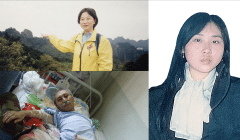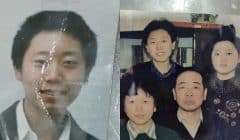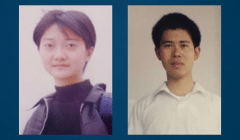Dr. Sen Nieh: A Man on a Mission
“I don’t know if I should do this interview,” Dr. Sen Nieh says as we sit down to chat. “I don’t want to show off.”
Certainly, Dr. Nieh has a lot to show off if he were so inclined. Throughout his twenty-four years of teaching Mechanical Engineering at the Catholic University of America, he has received numerous teaching and research awards, both in Taiwan and abroad, all while committing himself to supporting disadvantaged students in his program.
What has made Nieh a fixture in his university community and in the Chinese human rights movement, though, is his commitment to spiritual growth and religious freedom. Falun Gong, he says, is what impressed on him the importance of spiritual life and gave him some answers.
Though originally from Mainland China, Nieh grew up in Taiwan. He remembers how, when he was young, he and his family would bring fruit and incense to important festivals. They would kneel with them and kowtow north, “towards our original hometown, to remember the land and the family [we] left behind,” he explains.
“We always wanted to get rid of communism and return home.”
This dream motivated Nieh to attend prestigious National Taiwan University to study engineering—a popular subject in the small island living in the PRC’s shadow. “We wanted to learn technology so we could build airplanes and submarines to defend our country.”
But when Nieh, by then a motorcycle-riding, American-country-music-singing rugby champion from Taiwan arrived at the University of Illinois in 1980 excited about studying for his PhD, he discovered that his defense track was not open to foreigners. He decided to focus on energy and the environment instead, and after being hired at Catholic University eventually became chair of his department.
At that time, his work on China’s modernization made him a frequent guest speaker on the mainland. Nieh—whose expertise included not only combustion sciences and propulsion systems but also pollutants control and waste treatment—was made honorary professor at three PRC universities. In 1992, he received the Lectureship Award of the United Nations.
Yet when a personal tragedy struck, leaving him alone with three children to care for, his successes fell into stark perspective.
“Suddenly I realized I was nobody,” Nieh says. Feeling that material success alone could not fulfill him, he turned to traditional Chinese philosophy, studying Buddhism and Taoism. Then, in the summer of 1997, a friend gave him Zhuan Falun, the teachings of Falun Gong—Nieh says he was immediately drawn to the practice and its principles of truth, compassion, and tolerance.
“I started trying to incorporate truth and compassion into everything, family, work, everything,” Nieh says. He recalls that one of the most important lessons he learned from Falun Gong was that “it’s not so much what you say, but how you say it,” referring to the idea that it is one’s sincere intention that matters, not the superficial mix of words. “Purity can penetrate different levels of people’s hearts.”
He felt this principle proven to him time and again in his office during his tenure as chair of the Mechanical Engineering Department. “People always come to you with problems, never happy,” he says. “At that time I enlightened to the power of language. Applying truth, compassion, and tolerance, even with tough cases, in 10–20 minutes people would leave happy.”
Just as Dr. Nieh felt he had once again found harmony, his life took another turn on April 25, 1999. Following escalating suppression of Falun Gong on the mainland, over 10,000 adherents petitioned their government in Beijing that day, hoping that once it took the time to understand what Falun Gong was really about, China’s leaders would reverse their policies and worse persecution could be evaded.
Nieh decided to support the mainland efforts by appealing for the rights of Falun Gong practitioners at the Chinese Embassy in Washington. The response Nieh received would quickly become typical among overseas Chinese.
“In the past I was an honorable guest at the embassy,” he says. “As soon as I stepped forward [for Falun Gong], I was blacklisted. But it was the right thing to do, and I was very happy to do it.”
Nieh has since become a local champion for Chinese human rights, his initial and primary motivation being to stop the Chinese Communist Party from taking away the spiritual practice that gave him the happiness he had longed for.
“In the past, people of persecuted faith-based groups—be it Christians or Catholics of house churches, Tibetan Buddhists, Uyghur Muslims, or Falun Gong practitioners—have been very sad and, to some degree, hopeless,” Nieh said at a 2005 forum in Sweden. “But we are now able to see hope—the hope of a China without communism.”
Over the past eight years, Nieh has been busy lobbying congress, organizing rallies and marches. He became board director for the Global Alliance for Democracy and Peace, co-founded an organization that helps Chinese people to sever their ties to the Communist Party, and shook hands with the U.S. president at the dedication of the Victims of Communism Memorial in Washington this past June.
Amazingly, despite his new commitment to voicing dissent, Nieh’s work at Catholic University has not missed a beat. He is the most experienced person in his department, having published seventy scientific papers on eight patents of invention. More importantly to him, he has developed a knack for motivating students from disadvantaged economic backgrounds to finish their degrees. As a result, earlier this year Dr. Nieh won the university’s Award for Excellence in Teaching.
When asked about this new accolade, Nieh laughs. “I know if I never had gone through that life tribulation, I would still be busy with fame and fortune stuff,” he says. “I now know that life is for us to improve ourselves and strive for purity, not to squeeze it for every drop of happy times.”
“We should be responsible,” he says, “and take some time to learn what it is we are supposed to do in a more profound, spiritual way.”






